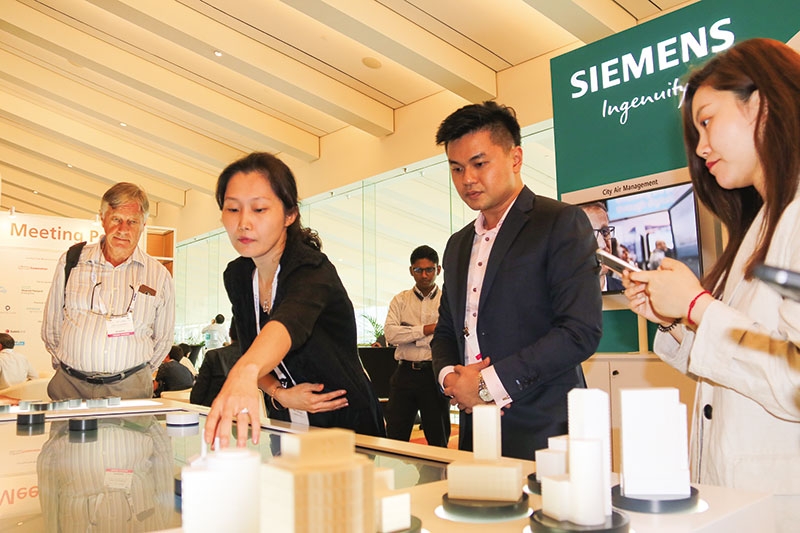Technology to make cities “liveable”
 |
| Siemens experts introduced their City Air Management solutions at WCS 2018 |
In the words of experts at the summit (WCS 2018), for cities to tackle contemporary urban issues, they need more than traditional solutions such as increasing green space and road surface areas, spending on mass transit transport systems like buses and metro systems or removing polluted factories from the inner city to suburbs. One of the most important things is the trend of cities going digital, paving the way for building up smart cities, along with other city concepts such as garden cities or forest cities.
In the report “Cities in the Driving Seat” released at WCS 2018, the German conglomerate underlined the need for cities to encourages other cities to anticipate and tackle upcoming changes to their infrastructures early, through the use of connected and autonomous vehicles (CAV)
Pete Daw, urban development and environment director at the Siemens Global Centre of Competence Cities, said that autonomous vehicles must be part of a wider transformation of urban areas. Cities need to ensure that they work towards putting people first–and not cars, or we risk repeating the mistakes of the past.
“The future of our cities could look very different with the adoption of connected and autonomous vehicles and they could help shape future trends in climate change, air quality, public health and more” he said.
Daw presented multiple benefits of using CAVs, including reductions of noise, air pollution, and greenhouse gas emissions; decrease of number of road fatalities and injuries; annually 1.25 million lives are lost around the world due to road collisions, with some 90 per cent of these collisions the result of human error compared to using internal combustion engines, decreased numbers of road fatalities and injuries, and expanded mobility access to the young, elderly, impaired, and marginalised.
“However, without clear and thoughtful policies and regulations the arrival of CAV could result in negative consequences, such as no decrease in vehicle ownership if individuals prefer their own CAV instead,” Daw said.
In addition to such long-term approaches, WCS 2018 also showed off a raft of solutions that could be expedited immediately, such as the City Air Management (CyAM), also provided by Siemens. CyAM is a cloud-based software suite with a dashboard that displays real-time information on the air quality detected by sensors across a city and predicts values for the upcoming three to five days.
Mayors and other decision makers can then use this data and a combination of potential solution measures to derive concrete recommendations for actions and define measures that help reduce concentrations of nitrogen oxides and atmospheric particulate matter.
“Data is really just raw material. They unleash their full potential only when we collect them correctly, analyse them correctly, draw the correct conclusions from them and simulate and run through the resulting options,” said Roland Busch, chief technology officer and member of the Managing Board of Siemens AG. “This is what makes CyAM such a unique software solution. It is currently the smartest tool available for cities that want to improve their air quality.”
CyAM can use the data acquired by sensors to recommend a selection of actions chosen from a set of 17 measures that can be implemented at short notice in order to improve air quality. Examples of such measures include establishing low-emission zones, reducing speed limits, and offering local public transportation services at no charge for a limited period.
On the occasion, Siemens signed a memorandum of understanding with leaders of Sino-Singapore Guangzhou Knowledge City (SSGKC) to kick-start the CyAM solution through the joint development of the Green City Digital Platform in SSGKC.
What the stars mean:
★ Poor ★ ★ Promising ★★★ Good ★★★★ Very good ★★★★★ Exceptional
 Tag:
Tag:
Related Contents
Latest News
More News
- Trung Nam-Sideros River consortium wins bid for LNG venture (January 30, 2026 | 11:16)
- Vietnam moves towards market-based fuel management with E10 rollout (January 30, 2026 | 11:10)
- Envision Energy, REE Group partner on 128MW wind projects (January 30, 2026 | 10:58)
- Vingroup consults on carbon credits for electric vehicle charging network (January 28, 2026 | 11:04)
- Bac Ai Pumped Storage Hydropower Plant to enter peak construction phase (January 27, 2026 | 08:00)
- ASEAN could scale up sustainable aviation fuel by 2050 (January 24, 2026 | 10:19)
- 64,000 hectares of sea allocated for offshore wind surveys (January 22, 2026 | 20:23)
- EVN secures financing for Quang Trach II LNG power plant (January 17, 2026 | 15:55)
- PC1 teams up with DENZAI on regional wind projects (January 16, 2026 | 21:18)
- Innovation and ESG practices drive green transition in the digital era (January 16, 2026 | 16:51)






















 Mobile Version
Mobile Version